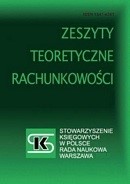Przychody z tytułu dotacji unijnych w sprawozdaniu finansowym przedsiębiorstwa
Presentation of income from European Union grants in financial statements of entities
Author(s): Katarzyna Żuk, Marzena WronaSubject(s): Economy
Published by: Stowarzyszenie Księgowych w Polsce
Summary/Abstract: The objective of this article is to present possible ways of recognizing income from EU grants in entity’s accounting records and financial statements. Since Poland’s accession to the European Union, business entities have obtained the possibility of using the support of European Funds in the form of grants on a scale unseen before. It has also caused some problems, mainly the problem of the proper accounting treatment of EU grants in the accounting records and financial statements of an entity. This gave rise to the idea of presenting the set of main rules relating to accounting for and presentation of grants as a source of income for business entities. The article is based on analysis of relevant literature, the provisions of the Accounting Act and International Accounting Standards, relevant documentation of the European financial support programs, as well as numerous European legal acts. It enabled the authors to put forward some solutions regarding presentation of grants in financial statements. The article has been divided into four main parts. In the first section the reader is introduced to the subject of the European Funds for the years 2007–2013 by showing the key instruments of the European Union structural policy, their division into operational programs in the years 2007–2013, and particular schemes which may obtain financial support. The second section presents the rules of disclosing grants in financial reports under the provisions of the Accounting Act and IAS. The capital and income approach to governmental grants as well as the method of presenting grants in financial reports as divided into asset subsidies and income subsidies have been presented in accordance with IAS 20. The third section discusses investment grants and research and development grants as examples of asset subsidies, and presents the rules of entering both into financial reports. Investment grants, as well as research and development grants are treated as asset subsidy and should be recognized in the balance sheet as deferred income in the liabilities section, gradually increasing other operational income along with the deduction of amortisation or depreciation of tangible or intangible assets financed from this source. The fourth part has been devoted to entering income subsidies into financial reports, taking as an example grants for training and consulting as well as grants constituting the reimbursement of incurred costs. Such grants may be recognized as income in a separate entry of the profit and loss account or in a general subsection entitled „Other income”. The second method could be deducting the amount of the grant from the costs incurred. Recognition of grants in the profit and loss account is also determined by the substance over form principle and the principle of matching revenues and costs.
Journal: Zeszyty Teoretyczne Rachunkowości
- Issue Year: 2010
- Issue No: 54
- Page Range: 221-234
- Page Count: 13
- Language: Polish

